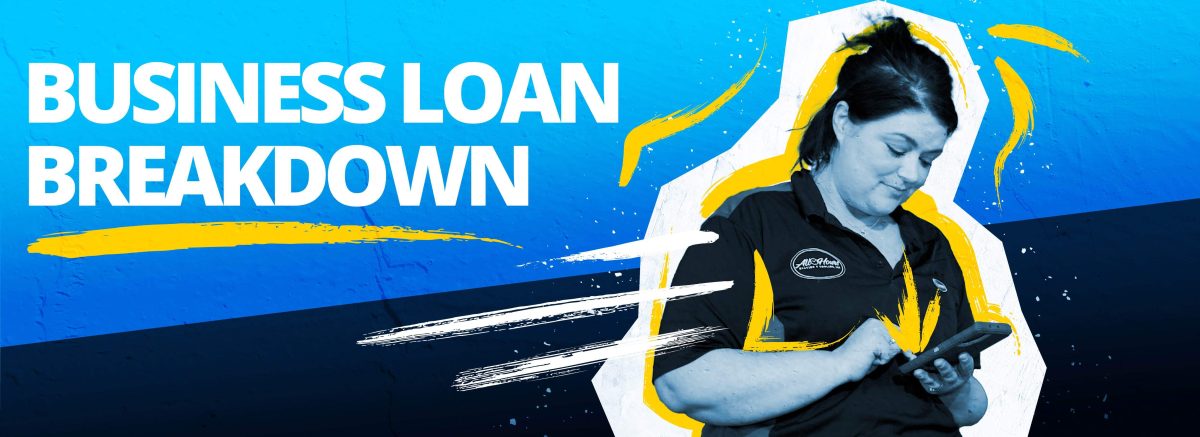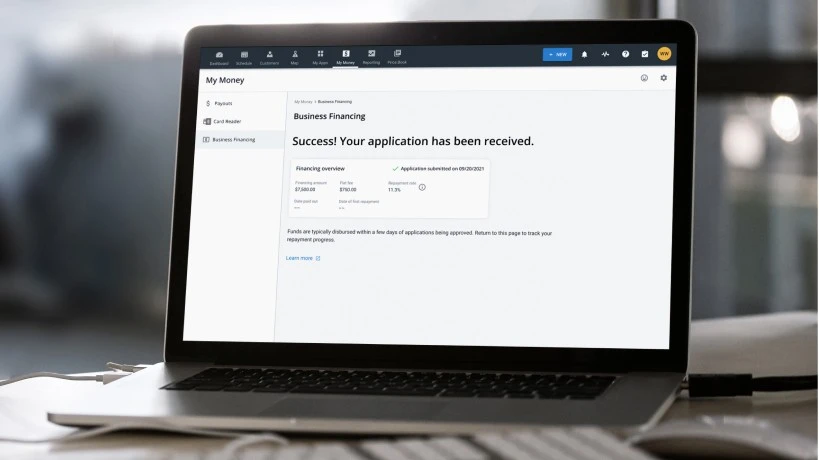
[Editorial note: The following content offers a basic overview of six different loan types. We recommend researching business financing on your own to find that “just right” option to fit your needs.]
Small businesses need a little lift from time to time, and a loan can make all the difference. For reference, the average small business loan amount in the U.S. is just over $50,000.1
There are many different business financing options out there. And each one has unique characteristics. Trying to make sense of all the loan types and how they work can be confusing to say the least.
In this article, we’ll break down six of the most common business financing options to help you get an idea of which might best suit your business.
Term loans
It only makes sense to start here since term loans are very common financing options. They’ve traditionally been provided by banks and credit unions, but online lenders have also started offering term loans in recent years.
This loan type is relatively simple in most cases. As a borrower, you’ll accept the funds from the lender and agree to pay back that amount plus interest over a set term. Specific terms and conditions vary depending on the lender.
Shorter-term loans are typically under 18 months, intermediate-term loans are from one to three years, and long-term loans run between three and 25 years.
Pros:
- Can have quick funding upon approval with many online lenders
- Relatively larger loan limits
Cons:
- On top of interest, there may be extra fees associated with the loan
- Can be difficult to qualify for depending on the lender
Merchant cash advance
Though not technically a loan, a merchant cash advance (MCA) is a way to finance your business based on the credit and debit card revenue you bring in on a regular basis. It’s different from a traditional loan in that the amount of funding you receive is based largely on your credit or debit card sales. The provider is basically buying your future sales transactions. Repaying your MCA will be a percentage subtracted from these credit or debit card transactions.
Fees and factor rates (the cost of financing calculated by factor rate multiplied by the amount borrowed) may differ depending on the MCA provider. Take your profit margins into account before accepting an MCA agreement.
Pros:
- With certain providers, repayment is automatic
- Relatively easy to qualify for, even with below average credit
Cons:
- On an APR basis, the cost of financing can be higher than traditional loans
- Cash flow is more directly impacted since repayment is based on credit card transactions
Business line of credit
A business line of credit usually has a shorter term, but with the following three factors:
- You don’t have to take out the entire line at the same time
- You can typically draw as many times as you need, up to your credit limit
- Your credit limit replenishes when you repay the borrowed amount
That means you’ll get the most out of the credit line without taking on more than you need. To some borrowers, this flexibility helps manage finances when business slows down. And we all know business can slow down. It can also offer quick cash to help you fund that next job.
Pros:
- Funding is flexible according to your needs
- Redraw funds without needing additional approval each time
- In many cases, there are no fees if you set up a line of credit—only if you draw from it
Cons:
- Typically lower limits
- Tougher to qualify since it requires strong credit
SBA loans
An SBA loan is a financing option guaranteed by the U.S. Small Business Association. With the help of SBA-approved lenders, small businesses can apply for a loan through a number of programs to receive as much as $5 million with terms of up to 30 years.2
You can use an SBA loan for many business-related needs from buying new equipment, and increasing your inventory, to disaster relief.
Pros:
- Lower interest rates compared to other financing options
- Long repayment terms
Cons:
- The application process can be extensive depending on the program
- Receiving the funds can take weeks or months
- Typically, more difficult to qualify for than other loan types
Equipment financing
If you’re looking to grow your business through some new tools or machinery, equipment financing might be the ticket. Depending on the total cost, some lenders will finance 100% of the purchase price. Otherwise, you can expect to put down about 15%-20%.
Equipment loans are similar to term loans, but the resources you purchase will be collateral for the lender. If you default on the loan, the lender can repossess the equipment to cover the costs plus any interest accrued.
Pros:
- You’ll own the equipment after the loan is repaid
- You don’t have to spend as much cash upfront to get started using the equipment
- With strong credit, you can negotiate better terms and rates
Cons:
- Can only be used on certain equipment purchases
- Additional fees may apply based on the lender
Invoice factoring
This one may seem complicated at first glance. But put simply, invoice factoring turns unpaid invoices into cash to help with the immediate needs of your small business. It’s a financing option where you sell outstanding invoices usually at a discounted rate to an invoice factoring company. That company will then provide cash at the total invoice value, often 60% to 95%. Either the borrower will ensure payment (recourse), or the lender will be responsible for collecting the amount owed by a customer (non-recourse). With non-recourse loans, a customer’s credit could be more important than the borrower’s.
Factoring fees can be applied if an invoice goes unpaid for a certain amount of time. (They’re typically anywhere from 1% to 5% of the total invoice amount.)
Pros:
- You can secure cash quickly to boost cashflow
- Somewhat easier to qualify for than traditional loans
- Potential to outsource collections depending on the lender
Cons:
- Typically available to businesses who invoice their customers with net terms
- Higher costs and additional fees if a customer fails to pay their invoice and the borrower is responsible (recourse)
Lending red flags
Do your homework. Know when to say “no.” It’s crucial to understand the full financial implications of taking on a loan.
Red Flag #1 – Note the Fine Print
Before taking out a loan, be aware of red flags like repayment terms and credit requirements. And if you find out about additional fees and surprise interest rates after you’ve signed the dotted line, it may be too late to back out without penalties.
Red Flag #2 – Overleveraging
Don’t accept funds that go way beyond what you need. Having extra cash on hand is awesome, but you’re taking a bigger risk against your business. No matter what a lender offers, it’s best to borrow only what you need.
Red Flag #3 – Lenders Unfamiliar With Your Industry
Work with lenders who understand your business and industry. A lender that doesn’t have certain industry insights may not have the right resources or terms to best suit your business.
Wrapping it up
Finding the right business financing can be overwhelming, but there’s an upside. With so many options, the odds are in your favor that you’ll find the right financing for your needs.
It never hurts to contact a finance pro to fully grasp how the different terms, fees, and rates will impact your business. Business financing can be hard, but luckily we’re here to help. Our partners at CONQUER – best in class coaching for home service entrepreneurs – are equipped to help you make the right decisions for your business.
Here’s another consideration while you’re researching the right direction for your business. Did you know Housecall Pro offers business financing? We do! We’ve developed financing options through Stripe Capital and Fundbox. In all your research, consider these two options as well.





